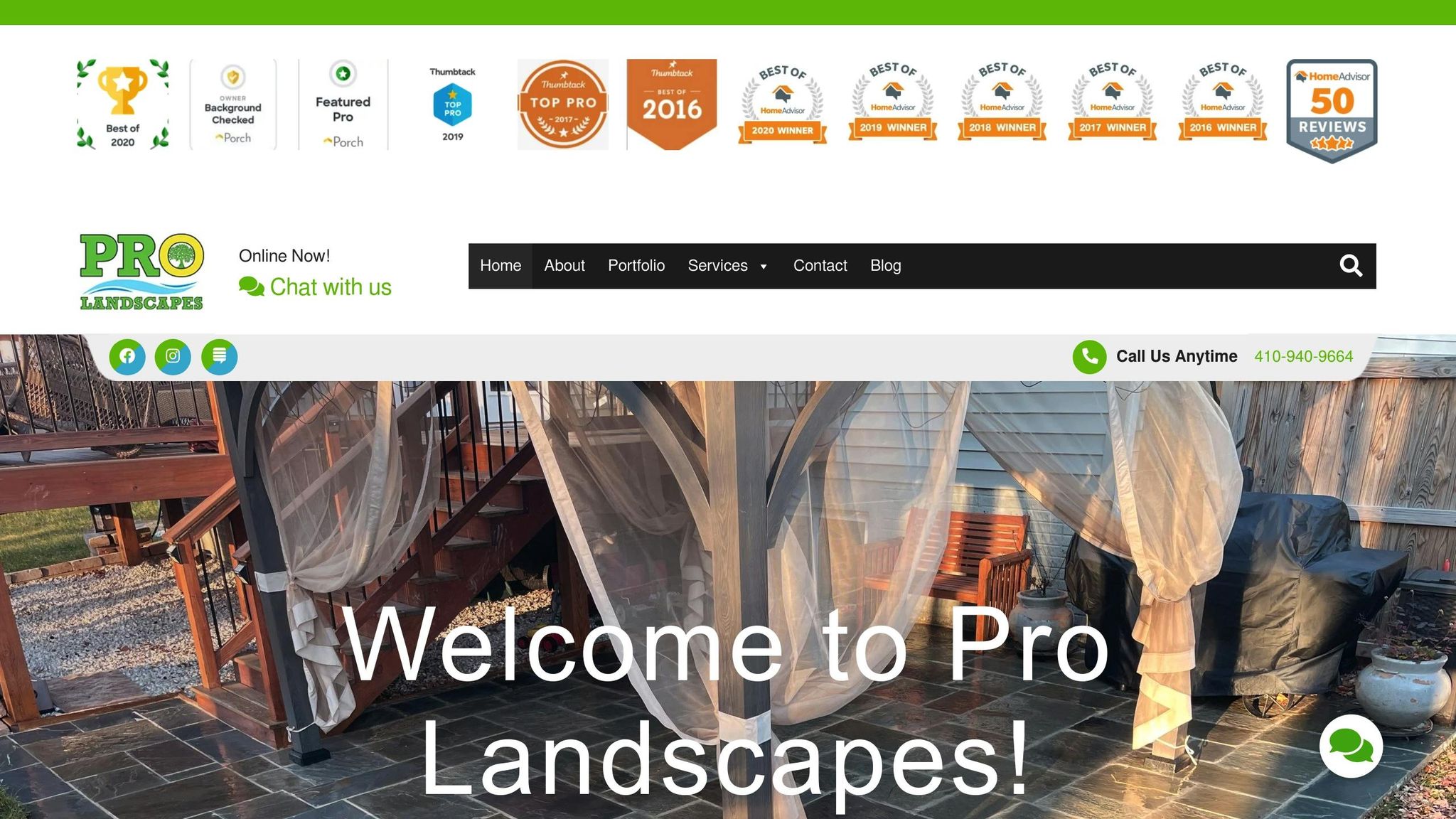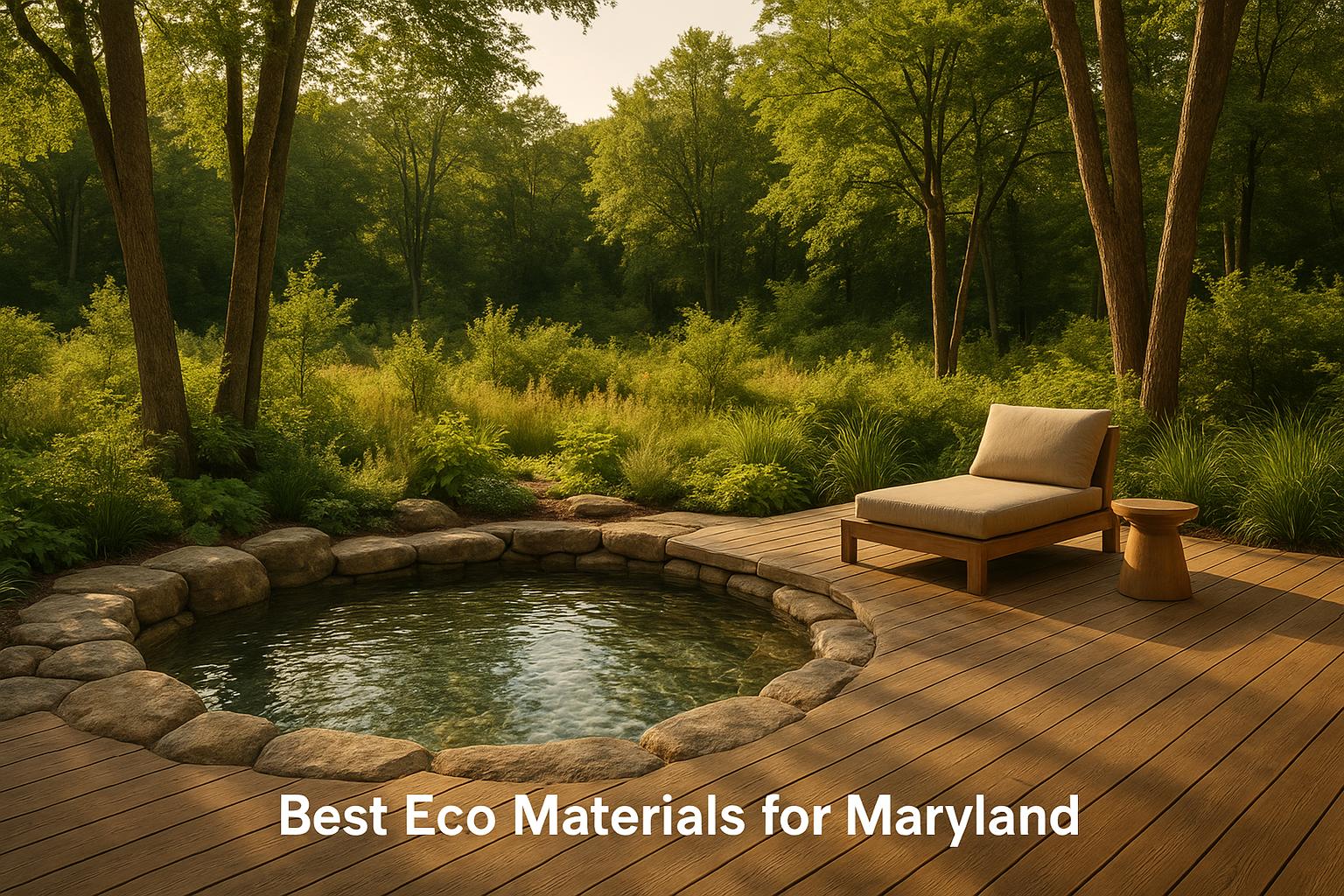- bhavya gada
- No Comments
Looking to build a spa in Maryland that’s eco-conscious and durable? Start with materials designed for the state’s humid summers and freeze-thaw winters. Here’s what works best:
- Reclaimed Wood: Adds warmth and character while reducing waste. Ideal for interiors and accents.
- Composite Lumber: Perfect for outdoor decking, resistant to moisture, insects, and rot.
- Recycled Glass: Great for countertops and tiles, offering durability and style.
- Natural Stone: Handles Maryland’s temperature swings; excellent for floors, walls, and patios.
- Permeable Pavers: Manage rainwater effectively, reducing runoff and ice formation.
- Bamboo Flooring: Rapidly renewable and antimicrobial – great for spa interiors.
- Low-VOC Finishes: Maintain healthier indoor air quality with natural plaster and plant-based sealers.
- Rainwater Harvesting Systems: Cut water bills by reusing rainwater for irrigation and cleaning.
- Native Plants: Use drought-resistant species to reduce irrigation needs and support local ecosystems.
These materials not only last longer but also help reduce costs and create a healthier space. Whether it’s reclaimed wood for a rustic feel or permeable pavers for better drainage, there are plenty of ways to build a spa that works with Maryland’s climate while being environmentally conscious.
How to Choose Eco-Friendly Materials
Selecting eco-friendly materials for your spa involves balancing sustainability with Maryland’s unique climate needs. The goal is to pick options that minimize environmental impact while fostering a relaxing and health-conscious space. Below, we’ll explore materials based on renewability, durability, and their contribution to indoor air quality.
Renewable and Recycled Materials
Reclaimed wood is both practical and stylish. By repurposing wood from barns or salvaged hardwood flooring, you not only reduce waste but also bring warmth and character to your spa. It’s perfect for accent walls, ceiling beams, and custom cabinetry.
Composite lumber, made from recycled plastic and wood fibers, is an excellent choice for outdoor decking and railings. It resists moisture, insects, and rot, making it ideal for Maryland’s humid climate where traditional wood might not hold up as well.
Recycled glass offers both beauty and functionality. Crushed glass can be embedded in concrete countertops, creating eye-catching surfaces with unique color patterns. Recycled glass tiles are another great option for walls and water features, offering durability and a non-porous finish.
Bamboo flooring is another standout, thanks to its rapid growth and ability to regenerate without replanting. It’s as hard as many traditional hardwoods and naturally antimicrobial, making it a smart choice for spa environments.
Durability and Climate Suitability
Durability is just as important as sustainability, especially in Maryland, where temperature fluctuations and high humidity are common. Natural stone, such as granite or slate sourced locally, is a fantastic option. It provides excellent thermal mass, which helps regulate indoor temperatures, and can handle freeze-thaw cycles without cracking.
For exteriors, fiber cement siding is a game-changer. Made from recycled materials, it resists rot, warping, and insect damage, ensuring your spa looks great year-round with minimal upkeep.
In outdoor areas, permeable pavers crafted from recycled concrete are a smart solution. They allow water to filter through, reducing runoff and preventing ice formation during Maryland’s wet springs and snowy winters. Plus, they support proper drainage, keeping your outdoor spaces safe and functional.
Cork flooring is another durable option, offering natural insulation to maintain comfortable indoor temperatures. It’s also hypoallergenic, antimicrobial, and soft underfoot, making it a cozy yet practical choice for spa interiors.
Non-Toxic and Low-VOC Options
To maintain a healthy indoor environment, opt for materials with low volatile organic compounds (VOCs) and non-toxic finishes. Look for certifications like Green Seal or GREENGUARD to ensure the products meet strict emission standards.
Natural plaster, made from clay, lime, and sand, creates stunning wall finishes without synthetic additives. It regulates humidity and doesn’t release harmful gases, making it ideal for spaces like saunas or meditation rooms.
Formaldehyde-free insulation, crafted from recycled denim or sheep’s wool, provides excellent thermal performance and soundproofing without the risks associated with fiberglass insulation. These materials help create a quieter, more serene spa environment.
For wood finishes, choose plant oil-based sealers. They avoid harsh chemicals and support healthier air quality, though they may require more frequent reapplication compared to synthetic options.
Lastly, when working with adhesives or caulks, go for water-based, low-emission products. These alternatives are just as effective as traditional options but help maintain a cleaner, healthier indoor atmosphere for your spa.
Best Eco-Friendly Materials for Maryland Spas
Building a spa that can handle Maryland’s humid summers and freeze-thaw winters while staying environmentally friendly is no small task. The right materials can make all the difference, ensuring your spa is both sustainable and durable in this challenging climate.
Reclaimed Wood and Composite Lumber
Reclaimed wood brings character and sustainability to spa construction. Imagine salvaged chestnut beams from old Maryland barns creating striking ceiling features or reclaimed heart pine flooring adding warmth to meditation rooms and changing areas. Each piece tells a story, with its natural patina and weathered look adding a grounded, calming vibe – perfect for relaxation.
For outdoor projects, reclaimed wood is a fantastic choice for spa enclosure walls, privacy screens, and accents around hot tubs. To protect against Maryland’s humidity and temperature swings, seal the wood with plant-based finishes.
On the other hand, composite lumber is a practical option for moisture-prone areas. Made from recycled plastic bottles and wood fibers, it resists warping, splitting, and rotting, even through Maryland’s wet springs and snowy winters. This makes it ideal for spa decking, outdoor shower platforms, and railings around water features. Plus, it’s low-maintenance – no staining or sealing needed – and retains its appearance for years, making it a smart investment.
Recycled Glass and Natural Stone
Looking beyond wood, materials like recycled glass and natural stone bring both beauty and functionality to spa spaces. Recycled glass, for example, transforms waste into stunning surfaces. When mixed into concrete, crushed glass creates countertops with a subtle sparkle and unique color variations. These surfaces are non-porous, resistant to bacteria and mold, and easy to clean.
Recycled glass tiles are another excellent option for steam rooms, saunas, and water features. They’re completely waterproof, hygienic, and available in colors that blend seamlessly with Maryland’s natural surroundings. Plus, their smooth surface feels great underfoot.
Natural stone, especially when sourced locally, combines sustainability with climate compatibility. Maryland bluestone, quarried right in the state, offers excellent thermal mass, naturally helping to regulate indoor temperatures. Its slip-resistant surface makes it ideal for wet areas like shower floors or pool decks.
Locally sourced flagstone is another great choice for pathways and patios. Its irregular shapes and earthy tones blend beautifully with native landscaping, and since it’s quarried nearby, transportation emissions are minimized. The stone is durable enough to handle Maryland’s climate with ease.
Permeable Pavers and Environmental Pavers
Permeable pavers are a smart solution for Maryland spa construction, tackling issues like heavy spring rains and winter ice. These pavers allow rainwater to filter through, reducing runoff and preventing ice buildup on walkways. Made from recycled concrete and other sustainable materials, they’re available in various styles to complement spa designs. They work well for parking areas, pathways, and spaces around fire pits, where proper drainage is key.
For an even greener option, consider environmental pavers. Pro Landscapes MD specializes in these paving solutions, which support water management while enhancing outdoor spaces. Often made with recycled content, these pavers are designed to work with Maryland’s soil and drainage needs.
The installation process includes preparing a base that boosts their water management capabilities. This not only creates a visually appealing space but also supports the local ecosystem by allowing water to filter naturally and reducing runoff that could carry pollutants into Maryland’s waterways. Their modular design also makes future replacements easy, cutting down on waste during renovations.
Water Management and Landscaping Solutions
Managing water effectively is a cornerstone of eco-conscious spa construction in Maryland. With the right strategies, water bills can be reduced by up to 50%, offering a return on investment within just 2–3 years [1]. This has sparked growing interest in advanced rainwater harvesting systems as part of sustainable spa design.
Rainwater Harvesting Systems
Maryland’s frequent rainfall can be turned into a valuable resource for spa operations through rainwater harvesting. For smaller spa projects, simple systems like rain barrels are a practical solution. These devices collect runoff from roofs, providing a steady supply of water for tasks like garden irrigation and outdoor cleaning. Plus, Montgomery County, MD offers rebates for rain barrel installations, making this sustainable option even more appealing.
For larger spa facilities, underground cisterns are a better fit, offering the ability to store thousands of gallons of water during rainy periods. This stored water can be used for irrigation and other non-potable purposes, reducing reliance on municipal water.
Integrated systems, such as RainXchange™, go a step further by combining collection, filtration, and distribution into a seamless solution, ensuring a consistent water supply. Harvested rainwater has its perks too – it’s less acidic than tap water and naturally rich in nutrients, making it ideal for nourishing plants around the spa.
Additionally, using rainwater harvesting systems can help spa projects earn credits under the LEED Green Building Rating System, boosting their environmental credentials. Pro Landscapes MD specializes in incorporating these systems into spa designs, seamlessly blending them with features like French drains and proper grading for effective stormwater management.
But water management doesn’t stop there. Choosing native, drought-resistant plants is another vital strategy for creating a sustainable spa landscape.
Native and Drought-Resistant Plantings
Maryland’s native plants are naturally suited to the local climate, making them a smart choice for spa landscaping. These plants generally require less water and are more resilient during dry spells, which is essential for maintaining a low-maintenance, eco-friendly environment.
A popular landscaping approach called xeriscaping focuses on selecting and positioning drought-tolerant plants to minimize or even eliminate the need for extra irrigation. Many native plants have built-in adaptations for water conservation, such as smaller leaves, waxy coatings, or fuzzy textures that reduce water loss.
Some standout choices for Maryland spa landscapes include Northern Bayberry, Adam’s Needle Yucca, and Black-eyed Susans. These plants not only thrive with minimal watering but also add vibrant colors and textures throughout the year. Butterfly Weed (Asclepias tuberosa), with its bright orange flowers, attracts pollinators like butterflies, creating a lively and dynamic ecosystem around the spa.
Native grasses like Switchgrass (Panicum) and Indiangrass (Sorghastrum nutans) bring striking textures to the landscape while requiring little to no irrigation once established. Their deep root systems also improve drought tolerance and help prevent soil erosion.
Shrubs are another great addition, providing structure and privacy around spa areas. Options like Nandina, with its delicate foliage that changes color seasonally, and Spireas, known for their springtime blooms, offer both beauty and functionality. Indian Hawthorn adds evergreen screening with fragrant flowers, while Abelias provide long-lasting blooms that attract butterflies.
To further enhance water efficiency, hydrozoning is a key technique. By grouping plants with similar water needs together, irrigation can be focused only where it’s truly necessary, allowing drought-tolerant areas to rely on natural rainfall. Preparing the soil properly is also crucial – adding organic matter improves its ability to retain water, while mulching helps reduce evaporation. Planting during fall or early spring gives plants a chance to establish strong roots before the heat of summer arrives, increasing their resilience to dry conditions.
With Pro Landscapes MD’s deep knowledge of local landscaping, native and drought-resistant plants can flourish with minimal upkeep, ensuring a sustainable and visually stunning spa environment.
sbb-itb-843f8be
Eco-Friendly Materials Comparison
Selecting eco-friendly materials is all about finding the right balance between reducing environmental impact and ensuring durability. Each option brings distinct benefits to the table, helping to enhance the sustainability of your project.
Key Environmental Benefits of Popular Eco Materials
Here’s a quick look at some popular sustainable materials and what makes them environmentally friendly:
| Material | Environmental Benefit |
|---|---|
| Reclaimed Wood | Cuts down on deforestation by reusing existing timber and keeping waste out of landfills [2] |
| Recycled Glass | Gives post-consumer glass a second life, reducing landfill contributions |
| Environmental Pavers | Improves stormwater infiltration and reduces runoff, aiding in better water management |
These materials are central to creating eco-conscious designs, especially in spa projects across Maryland.
For example, reclaimed wood not only saves resources but also adds a rustic, natural aesthetic. Recycled glass brings a unique, eye-catching element while cutting down on waste. Meanwhile, environmental pavers are a win-win for both design and functionality – they improve drainage while reducing water-related issues. Pro Landscapes MD frequently uses these pavers to deliver beautiful, sustainable designs with smart water management solutions.
Pro Landscapes MD‘s Expertise in Eco-Friendly Solutions

Pro Landscapes MD has built a strong reputation in central Maryland for their expertise in eco-conscious spa construction. With years of experience, they focus on creating sustainable outdoor spaces that align with the region’s unique climate challenges.
"At Pro Landscapes MD, we specialize in creating outdoor environments that blend beauty, function, and sustainability." [3]
Eco-Friendly Hardscaping and Drainage Solutions
Pro Landscapes MD excels in hardscaping solutions that prioritize sustainability and water-smart design. Their patios, crafted from natural stone and environmentally friendly pavers, are not only visually appealing but also effective in managing water. These materials are particularly suited to Maryland’s climate, standing up to humid summers and the freeze-thaw cycles of winter.
Retaining walls are another key feature, designed to combat erosion and stabilize slopes, especially on uneven spa sites. By addressing grading and slope challenges, these walls protect both the spa structures and the surrounding landscape.
When it comes to Maryland’s stormwater issues, Pro Landscapes MD takes a proactive approach. They incorporate berms and swales to guide water flow naturally, reducing erosion while maintaining the aesthetic charm that spa environments demand. These systems direct water away from structures and encourage natural soil absorption.
For a more striking and functional touch, they offer dry riverbeds and rain gardens. These features not only manage stormwater during heavy rains but also enhance the beauty of the landscape. Rain gardens, in particular, filter pollutants and support local plant life, adding ecological value. French drains and regrading services further ensure effective water management, preventing issues like pooling or foundation damage.
This comprehensive approach demonstrates their dedication to sustainable practices, seamlessly integrating materials and water management into their designs.
Commitment to Quality and Green Building
Pro Landscapes MD pairs their eco-conscious designs with a commitment to quality craftsmanship. Their use of environmental pavers highlights this dual focus, offering surfaces that improve stormwater infiltration while complementing spa aesthetics.
Clients frequently commend their attention to detail. One homeowner praised their stacked stone installations, which beautifully enhanced trees and flowerbeds while blending effortlessly with eco-friendly spa designs. This type of natural stonework creates cohesive, harmonious outdoor spaces.
Their expertise spans a variety of applications, including flagstone walkways that minimize runoff and natural stone steps that integrate seamlessly with existing landscapes. Even their fire pit installations reflect their green philosophy, using sustainable materials and proper drainage to ensure functionality without environmental compromise.
Homeowners across Maryland rely on Pro Landscapes MD for consistent, high-quality designs that prioritize eco-consciousness. This consistency has solidified their reputation as a go-to partner for sustainable spa projects in the region.
Adding to their expertise is their professional horticulture background, which allows them to tailor installations to Maryland’s specific soil conditions, native plants, and weather patterns. This ensures that their spa designs not only look stunning but also thrive over time, delivering long-lasting beauty and functionality.
Creating Your Eco-Friendly Spa Retreat in Maryland
Building an eco-friendly spa in Maryland offers a range of benefits, from cost savings to improving health and environmental quality. Using sustainable materials like reclaimed wood, composite lumber, and permeable pavers allows your spa to withstand Maryland’s fluctuating humidity and temperatures. These materials not only last longer but also help manage stormwater naturally, reducing the need for extensive drainage repairs.
Choosing sustainable materials goes beyond durability – it contributes to a healthier and more relaxing environment. For example, low-VOC finishes and natural stone surfaces avoid releasing harmful chemicals, creating cleaner spaces ideal for unwinding. Adding native plants to your landscape reduces the need for frequent watering and fertilization, cutting down on maintenance while supporting local wildlife.
Maryland’s climate makes eco-friendly choices even more practical. Natural stone and recycled glass materials can handle freeze-thaw cycles, while drought-tolerant plants thrive through hot summers without constant irrigation. Together, these elements create outdoor spaces that work in harmony with the local environment.
With expert design, these sustainable features can transform your spa into a visually stunning retreat. Flagstone walkways, natural stone accents, and well-placed rain gardens combine timeless beauty with functional stormwater management, offering year-round appeal.
Pro Landscapes MD specializes in Maryland’s unique conditions, including soil types and weather patterns. Their expertise in environmental pavers and sustainable drainage solutions ensures your spa remains a low-impact, functional escape for years to come.
Eco-friendly materials not only cut utility bills and reduce upkeep but also increase property value. By aligning your spa with sustainable practices and Maryland’s focus on green construction, you’ll create a relaxing haven that benefits both you and the environment.
FAQs
What makes reclaimed wood a great choice for building eco-friendly spas in Maryland?
Reclaimed wood is a smart choice for building eco-conscious spas in Maryland, thanks to its long-lasting nature and environmentally friendly qualities. By reusing wood from older buildings, you not only cut down on waste but also help conserve natural resources – a win for both your spa and the planet.
Beyond its environmental benefits, reclaimed wood brings unique textures and rich character to your spa’s design. This adds a warm, welcoming vibe that elevates the overall experience. Plus, its natural durability makes it a great match for Maryland’s climate, ensuring your spa remains both attractive and functional for years to come.
How do permeable pavers support water management in spa areas?
Permeable pavers offer a smart, environmentally conscious way to manage water in spa settings. These pavers let rainwater pass through their surface and soak into the ground, which cuts down on surface runoff and helps lower the chances of flooding. Plus, they act as a natural filter, removing pollutants from the water while also replenishing groundwater supplies.
In a state like Maryland, where heavy rainfall and stormwater management are key concerns, these pavers can make a big difference. By using permeable pavers, you can design a spa space that not only looks great and functions well but also supports the environment.
Why is bamboo flooring a sustainable option for spa interiors in Maryland?
Bamboo flooring stands out as an environmentally friendly option, primarily because bamboo is a fast-growing grass that can regenerate in just 5-7 years after harvesting. In contrast, traditional hardwood trees often require several decades to reach maturity. This rapid growth cycle makes bamboo a renewable and eco-conscious alternative.
Beyond its green credentials, bamboo is known for its durability and resistance to moisture, qualities that align well with Maryland’s fluctuating climate. Its natural beauty also brings a warm, soothing vibe to interiors, making it an ideal choice for spa spaces where relaxation and tranquility are key.


















Chat with Us